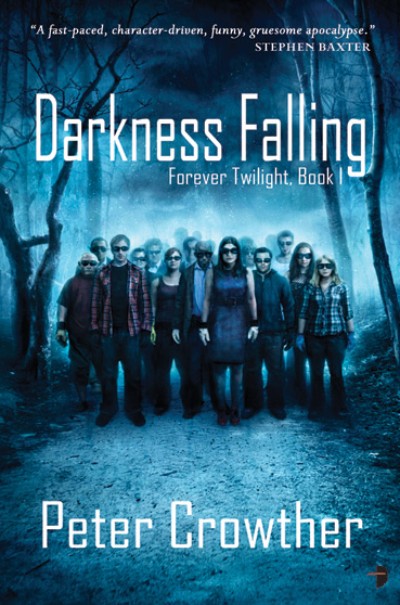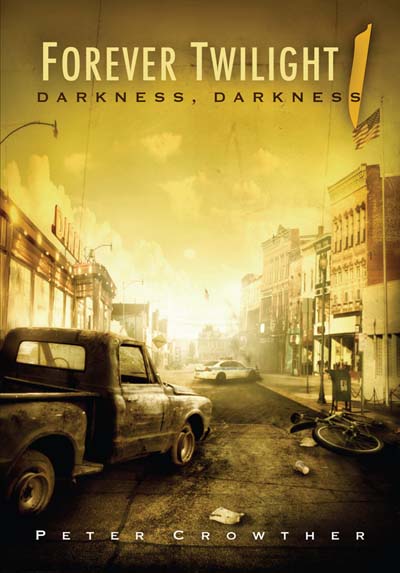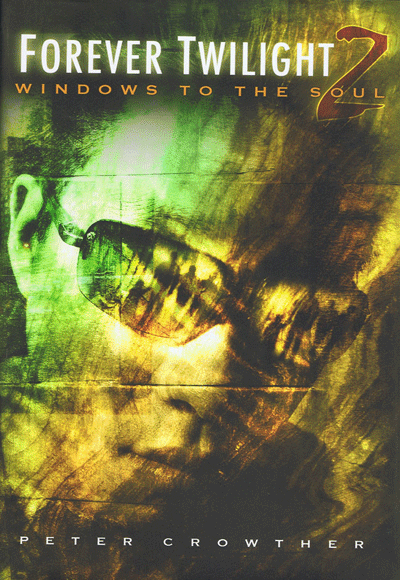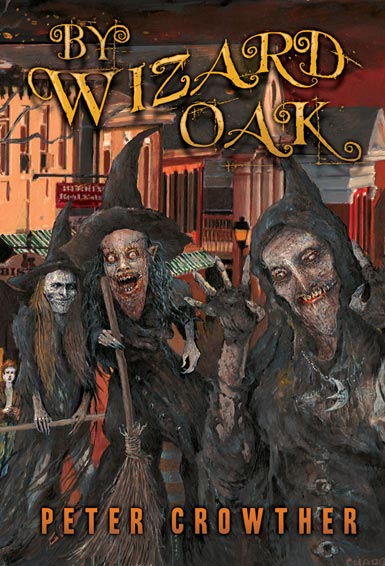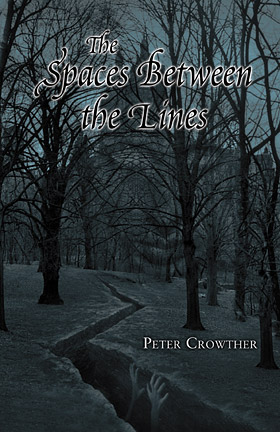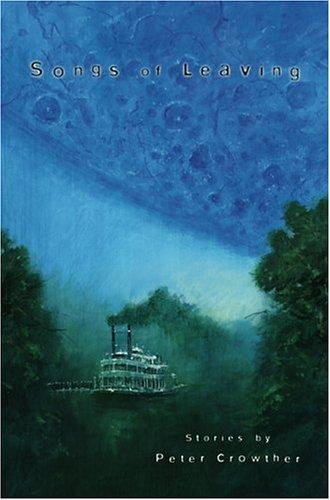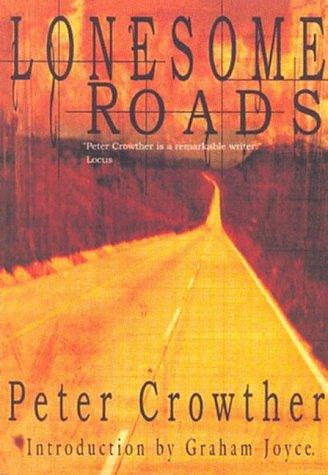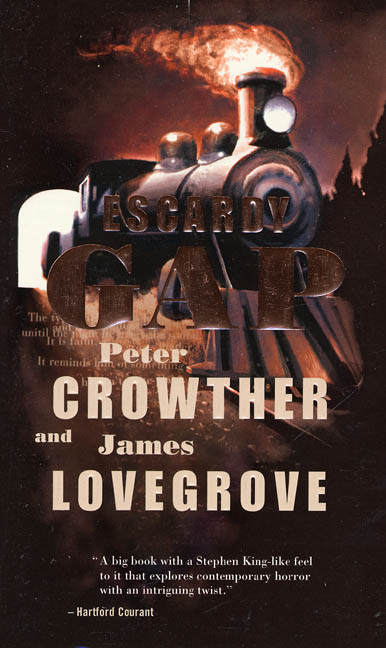Praise for Peter Crowther and his stories
“In our minds there's a curtain which we generally prefer to leave in place. It's a modern thing, and a very old thing. Peter Crowther has a cunning craft of twitching the curtain. He draws it only partially aside. We glimpse only part of the horror. The rest is left to miscegenate with our own private horrors. 'Cankerman' is a classic story in this respect.”
"Peter Crowther's 'Too Short A Death', a quest into the (genuine) mystery of American Poet Weldon Kees, is a cracker of a vampire tale. The sympathetic central character and his totally convincing involvement with modern American poetry carry the reader way past any clichéd expectations.”
“Reading [Songs of Leaving] is like discovering a primo Ellison collection you never knew existed. One of the more luminous collections of the year.”
“Anyone who enjoys Joe Lansdale's more retro efforts will certainly welcome peter Crowther's Forever Twilight which very intelligently and deftly invokes a host of cinematic spookshows from Invasion of the Body Snatchers onwards.”
“Crowther’s twisted rapture is a fast-paced, character-driven, funny, gruesome apocalypse. Forever Twilight will cast a shadow on your soul.”
“In this spectacular short novel, Peter Crowther captures the western setting beautifully, piling up the chills the way they used to do in the best 1950s-style cinematic horror.”
“These lovely and thoughtful stories (The Longest Single Note) are speculative fiction at pretty much its best, conjuring self-contained worlds that, for all the stories' brevity, teem with life.”
“Peter Crowther's 'Other Trains' is evocative, haunting, sad, beautiful and chilling. A huge order to bring off and he did it.”
”Peter Crowther's 'Incident On Bleecker Street' is rich in its weave of language and is audaciously spurning of convention. A dizzying soup of half-glimpsed characters and achingly logical arguments about what is and is not and could or couldn't be. The story fizzes on the page--choose a passage at random and let yourself drift.”
“From its quiet start to its rip-roaring finale, Darkness, Darkness is a riveting read. It’s packed full of edge-of-the-seat action, superb suspense and grisly set pieces. But Crowther never loses sight of the fact that it’s the characters that matter, and in Rick, Geoff, Melanie and Johnny he’s created a humane quartet the reader comes to care about. A triumph.”
“As intensely menacing and gruesome as any George Romero film, Darkness, Darkness also recalls the classic novels of American small-town terror and offers mystery as well. A virtuoso ‘tour de force’ by Pete Crowther.”
“As Nathaniel Hawthorne wrote, 'the romancer should dream strange things and make them look like truth.' I would say we can add Peter Crowther's name to the list of romancers and underline it a time or two. His work dances across the high wire, knowing there's no net below to catch them, but never looking down or faltering.”
“Besides being being the head of PS Publishing, and the editor of Postscripts magazine and numerous anthologies, Peter Crowther is also a widely acclaimed short story writer. His novella collection Lonesome Roads won the British Fantasy Award and Songs of Leaving was nominated for the World Fantasy Award, but readers will likely be more familiar with his debut short-story collection The Longest Single Note, which contains twenty-six 'compositions.' The Spaces Between the Lines gathers together a dozen more but none of them of these prepared me for the pure power of 'Even Beggars Would Ride,' a collaboration with James Lovegrove (with whom Crowther also wrote the novel Escardy Gap). This story of a diseased girl, her dreams, and her mother alternates scenes of stomach-knotting life-like horror—and I mean I was truly horrified by these scenes, which any horror fan will tell you is a rare occurrence indeed—with scenes of heart-leaping hope and triumph. From the most twisted cruelty to the deepest sorrow to the zenith of bliss, I can't remember the last time a short story has put me through the wringer like this. I was utterly in awe, and Crowther managed to impress me continually.”
“Peter Crowther's Forest Plains tends towards set pieces, lush language, a nod towards Bradbury, and a build-up to a single devastating effect. It's a dicey proposition, but one carried off with uncommon skill.”
“I wish Pete Crowther would stop writing the Forever Twilight series! Why? Because I keep reading it instead of writing. I keep saying, 'Oh, hell, I'll just read another chapter,' and then I say, 'Okay, Jack, read just one more and then, really, really, you have to get down to your own stuff.' None of that worked, so I gave it up and just kept reading. Forever Twilight is fast-paced, un-put-down-able, and immersed in popular culture . . . truly terrific.”
“Forever Twilight is an old-fashioned story written with a contemporary sensibility. Old-fashioned, because there’s a slow build, with time taken for us to get to know the characters and setting before the real drama sets in. There’s also a mood, an eerie, creeping air to the proceedings that you just don’t get in modern stories, certainly not modern horror stories where it’s one slash scene, then cut and zip on to the next one. Terrific!”
“If you're going to read only one perfectly-pitched, witty, tightly-told, acutely, affectionately and knowingly-observed battle-against-the-odds contemporary zombie series these darkening days, then make it this one. Everything else is stumbling blindly through a lost and ravaged world with its hands held limply out and drooling from both sides of its mouth. Peter Crowther's Forever Twilight saga, on the other hand, knows exactly where it's going . . . and exactly what it intends to do when it gets there.”
“To write with grace is perhaps the most difficult achievement facing a writer -- any writer -- but reading Peter Crowther, that grace is evident in every line, and it fills me with wonder and admiration. More than ever, storytellers belong to our time, and if I'm going to have anyone tell me about the end of the world, it will have to be Peter.“
“In even the darkest corners of Peter Crowther's supernatural universe, the essence of a peculiarly human redemption illuminates the depths.”
“Darkness, Darkness is an unmitigated ball. I enjoyed every single page of it. This is the kind of ‘horror’ movie Hollywood should be making. Great characters, great story and a mood—greasy grey midnight fog—that never lags. A terrific page-turner.”
“Much recent zombie fiction is merely an excuse for a gore fest, and though there's gore aplenty in this short novel, it's balanced by astute characterisation and a keenly observant eye for the details of smalltown America. Six months before the novel opens, Rick killed a young couple in a terrible road accident. Living with his brother Geoff, Geoff's wife Melanie and DJ Johnny in a secluded radio station, Rick is still crippled by remorse when, in the early hours of the morning, the rest of the human race vanishes only to return a day later – possessed, and hell-bent on adding our heroes to their ranks. Crowther never loses sight of the fact that it's the characters that matter, and in Rick, Geoff, Melanie and Johnny he's created a flawed quartet the reader comes to care about. From its quiet start to its gripping finale, Darkness, Darkness is a riveting read.”
“Certain profound spiritual and emotional needs can’t be met by lovers, religious institutions, psychiatrists or English cocker spaniels; even — especially — in a place like New York City. That’s why God invented bars. Yet even God has Her ‘off days’. How else to account for the loss of places like the Cedar Tavern and Lion’s Head, hangouts for earlier generations of bohemian New Yorkers? How else to account for the loss of Bohemia itself (but that’s another story)? And that’s why Pete Crowther invented The Land at the End of the Working Day. Bless Peter Crowther for opening that door at Twenty-Third and Fifth and clearing a place at the bar for those of us who, like the regulars there, need a place to prolong the reverie.”
"A story like 'Front-Page McGuffin' could easily have appeared alongside the fiction of Ray Bradbury and Isaac Asimov in the pulps of the fifties. If you came across it in a 1970s-era back issue of The Magazine of Fantasy & Science Fiction, in between entries by Sam Delaney and Spider Robinson, you would not have thought twice (as others will note in their introductions, Pete’s Working Day tales are intended, quite consciously, as homage to Spider Robinson’s Callahan’s Saloon stories, although they’re also rather more than that). But to find them in our own age is a modest sort of wonder.
"And so here’s why I was blue after finishing 'Front-Page McGuffin and the Greatest Story Never Told.' I often think this kind of fiction is dying now. Like the Ivory-Billed Woodpecker, or the Siberian Tiger, the free range fantasy narrative can hardly be found in the wild anymore, and may soon only exist in the arid, dismal zoos of academia (if there). To put it another way, I think stories of this sort have taken their seat on a stool in the Land at the End of the Working Day, or soon will. They have only one slim chance of survival. To be read and shared and loved."
"'Cleaning Up’ by Peter Crowther is an object lesson on writing a story about a haunting. Gruesome, disturbing, unsettling and very good."
"Anything that has Pete Crowther's fingerprints on it is evidence of quality. Snap it up."
“A masterpiece of suspense and dread that’s moving, powerful and truly terrifying...and he’s only just begun. Fast-paced, frenetic and fearsome—and not without its moments of humour—Darkness, Darkness delivers on all fronts. If the idea of John Wyndham’s The Midwich Cuckoos filmed by George Romero (with a heavy dose of Jack Finney’s The Body Snatchers) appeals to you then this first instalment in what promises to be a stunning novella series is the book for you.”
"Peter Crowther's a remarkable writer."
"Somewhere on the windswept east coast of Yorkshire there’s a mind so steeped in the idioms and lore of American pop culture that it all but constitutes a 51st state. The mind belongs to Peter Crowther, and at the heart of its multifarious, ever-churning swirl are the picket-fence stylings of Rockwell, the folksy profanity of King, the deadpan gravitas of Serling, and the madcap irreverence of Bunny (Bugs).
"Forever Twilight is an ambitious take on the small-town-in-peril horror subgenre, ordinary people confronted by overwhelmingly extraordinary evil. The bad guys are as unknowable and alien as the good guys are believable and human. The End Of Civilisation As We Know It comes with a burst of light, and everything thereafter is darkness. But Crowther has the torch, and when he’s not holding it under his chin going ‘Bwahhah-hah!’ he’s using it to show us the way.
"Of course, it might not necessarily be the way out . . . “
"Forever Twilight is the mutant offspring of an unholy coupling between The Stand and the Left Behind series, extravagantly endowed with the virtues of gonzo storytelling.”
"It's not as well known as it should be that artists Francis Bacon and Norman Rockwell had a gay love tryst in the Chelsea Hotel and gave birth to the soul of Peter Crowther. His stories--particularly the truly heroic 'All We Know Of Heaven'--travel the blue highways of the heart into that America we all grew up loving but can no longer recognise. There's nostalgia and genuine affection in his tales of quiet and unquiet horror, told with the gleeful malevolence of a whoopee cushion on an electric chair. Very strong, human, often moving and frequently disturbing. We ride a wave of words a million years deep and that wave shows no sign of breaking . . . yet or ever.”
"Amid a genre strewn with dim exertions, Peter Crowther's work pirouettes. His sly grace disturbs invisibly; blueblood voodoo.”
“Pete Crowther has what all writers worth their salt should strive for—the almost mystical ability to capture his readers from the first sentence. Darkness, Darkness generates an air of brooding menace coupled with a blistering energy that had me racing down each page, frantic to know what was going to happen next. I’m not sure how long I can wait for book two!”
"A writer who can combine such mastery with a brilliant imagination is one who will go far, and Crowther manages to do that. One expects this kind of brilliance from a seasoned professional in the horror genre and Crowther, no stranger to the art of literature, delivers the expected.”
"The first two helpings of Pete Crowther’s ambitious Forever Twilight could be a great movie! Maybe even two! His writing is master storytelling at its finest—gripping, chilling and beautifully told.”
". . . rich in well-developed characters and dark ambience.”
"Like Ray Bradbury, who is intentionally invoked, Crowther enchants as he tells deceptively simple tales of eternal truths.”
"Reports of the demise of the darker genres abound, but vigorous, genuinely fearsome work such as Crowther's demonstrates that the genre is decidedly undead.”
"Crowther (The Longest Single Note) shows impressive versatility in this collection of 12 weird tales that evoke a variety of moods ranging from wonder to horror. These stories are grounded in believably wrought emotions that make their strangeness both credible and affecting.”
“I’m lairy of comparisons to other authors, since that can seem rather condescending; but I was reminded by by the first two volumes in Pete Crowther’s Forever Twilight cycle of the best of Stephen King, not just in the horror and the scares, but in the way Pete orchestrates his various, ordinary, bruised and troubled characters and the way he powers the story through. This is something that should run and run—excellent writing throughout, and disgustingly readable. It’s the smartest and most compelling end-of-the-world alien-zombie story I have ever read.”
“This new collection by Peter Crowther offers real nourishment for all connoisseurs of short fiction, for the author is a master of the form. Though prominent and highly respected in the fields of dark fantasy and crime fiction, Songs of Leaving brings together a group of Crowther gems that are thematically science fiction. What is perhaps most striking about these works is that Crowther is using the genre not to extrapolate futuristic ideas per se--though indeed there are some wonderful and inventive concepts at work here--but moreover, he explores the effects of these concepts on his characters, sometimes in isolation, sometimes as part of a larger society. Consequently these stories are about humanity, whether it be defined as the simple fact of being human, as mankind itself or as the quality of being humane.”
“It's evident from reading the first book in the Forever Twilight series that Peter Crowther is crafting the first great post-apocalyptic saga of the new century, one that may dwarf even such a benchmark work as The Stand. Wildly imaginative, with finely drawn characters and terrifying scenarios, this series is one that every fan of horror and science fiction will want on their shelves.”
“This new Land at the End of the Working Day story by Pete Crowther is compounded of a number of stories told by Pete’s regulars and by three newcomers. These stories feed into one another, revealing not only their truths, but also the qualities of the men who relate them. They each serve the purposes of a plot that, in another sort of story, might have been central, yet here becomes something of a divertissement, lightening the weight of the other matters touched upon, adding a bit of shagginess to the dog. Pete orchestrates the interweaving of the stories (ghost stories, moral tales, reminiscences, et al) with such consummate deftness that, when you’ve done reading, you feel a bit wobbly. It’s as if you’ve downed more than a few beers in The Land at the End of the Working Day and, kibitzing from a nearby booth, have eavesdropped on the many voices of the tale, themselves given order and measure by the soft and subtle inventions of Dave Brubeck. This is all managed with such apparent effortlessness and naturalness, you suspect that—as outstanding a writer as he is—Pete Crowther might make an even better bartender.”
"By turns eerie and ominous and heart-in-mouth thrilling, Darkness, Darkness makes you want to take the phone off the hook, draw the curtains tight, settle into a chair and just ‘read’!”
"Everyone knows that when everyone else in the world disappears in a blinding flash, they’re bound to be back in no time at all as bloodthirsty zombies—but who would have expected them to be driving flying cars? And yet, when you think about it, it really does make perfect sense . . . “
"Pete Crowther’s Darkness, Darkness reminds me in its power and authenticity of Stephen King’s novella The Mist. Brilliantly observed and vividly atmospheric, it’s one of the eeriest stories I’ve read. and then it becomes one of the most terrifying and viscerally intense. And this is just the first part of a vividly realistic version of The Rapture, a waking nightmare brought about by no familiar deity, crafted with impeccable colloquial skill. A sheer masterpiece.”
"I have learned more about suspense and horror from reading this work of Peter Crowther's than I would have hoped to learn from a dozen books."
